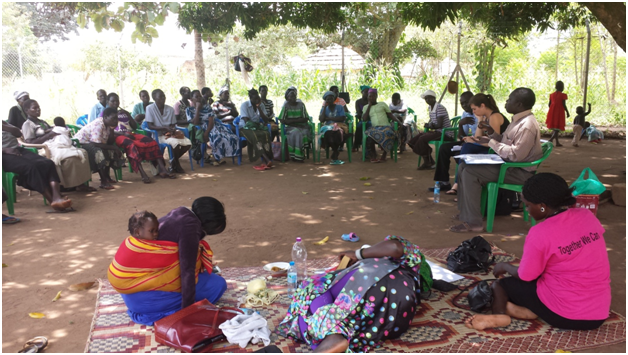
Redress for Sexual- and Gender-Based Violence on Conflict-Related Wrongs
Donor: John D. and Catherine T. MacArthur Foundation
Duration: January 2014-December 2016 (3 years)
In the process of continuous engagement with war-affected communities, JRP established that victims of SGBV remain marginalized in mainstream TJ discourse and mechanisms in Uganda and beyond. Oftentimes, their voices are lost at the initial stage of TJ development because of silence and social taboos surrounding SGBV crimes. From 2014-2016, the Gender Justice Unit (GJU) is implementing a project, “Redress for Sexual- and Gender-Based Violence on Conflict-Related Wrongs,” funded by the John D. and Catherine T. MacArthur Foundation, to ensure that gender issues are woven into the fabric of TJ in Uganda at the earliest possible stage, believing this will ensure the development and implementation of TJ mechanisms that are responsive to gender concerns during and as a result of northern Uganda’s long-standing armed conflicts. To do this, we engage survivors, communities, opinion leaders and policy-makers on the plight of SGBV survivors, how to respond to SGBV in their spheres of influence, and how support efforts to combat stigmatization and marginalization of SGBV survivors.
Under this project, JRP—through the Women’s Advocacy Network (WAN), a forum where more than 400 conflict-affected women to come together to advocate for their gender justice needs—propels the voices of female survivors of conflict SGBV to engage in advocacy both in their communities and in national forums. Over three years, we shall form and support nine women’s groups in Lira, Pader and Adjumani districts through this project.
Goal
To support transitional justice efforts for survivors of SGBV in northern Uganda
Purpose
To promote the reintegration of victims of SGBV into their communities in northern Uganda
Objectives
- To undertake community-based documentation on SGBV in order to promote advocacy at various levels;
- To strengthen grassroots women survivors to respond to SGBV at community levels;
- To undertake survivor-led engagements at community levels;
- To create a platform for advocacy, networking, referral and information-sharing.
Increasing Redress for Female Victims of SGBV in Northern Uganda through Economic Empowerment

Donor: Uganda Fund
Duration: January -December 2015 (1 year)
“Increasing Redress for Female Victims of SGBV in Northern Uganda through Economic Empowerment” is a WAN-initiated project that seeks to ensure that female victims of sexual- and gender-based violence (SGBV) in northern Uganda have increased redress through economic empowerment. Emboldened by UN Resolutions 1325 and 1889, which acknowledge that lack of economic empowerment impedes the full participation of women and girls in peacebuilding, this project aims to remove an obstacle to women’s participation in transitional justice (TJ) by increasing the economic independence of war-affected women already engaged in gender justice. Over twelve months, it will engage 190 female victims of SGBV from five WAN groups in Gulu, Lira, Pader and Adjumani districts in northern Uganda in group income-generating projects (IGAs), vocational skills trainings, revolving loan and savings schemes and financial management trainings in order to increase income entering their households, vocational skills relevant to their group IGAs, access to revolving loan and saving schemes and capacity to conduct personal financial management. As a result of this project, the participating women will realize greater economic opportunities to meet their basic needs, vocational knowledge to improve their livelihoods and agency to plan for their futures, and in time, enhance their ability to seek redress for past abuses.
Goal
Female victims of SGBV in northern Uganda have increased redress through economic empowerment.
Objectives
- Female victims of SGBV in five WAN groups have increased economic opportunities to meet their basic needs.
- Female victims of SGBV in five WAN groups have increased knowledge of vocational practices to improve their livelihoods.
- Female victims of SGBV in five WAN groups have increased agency to plan for their futures.
